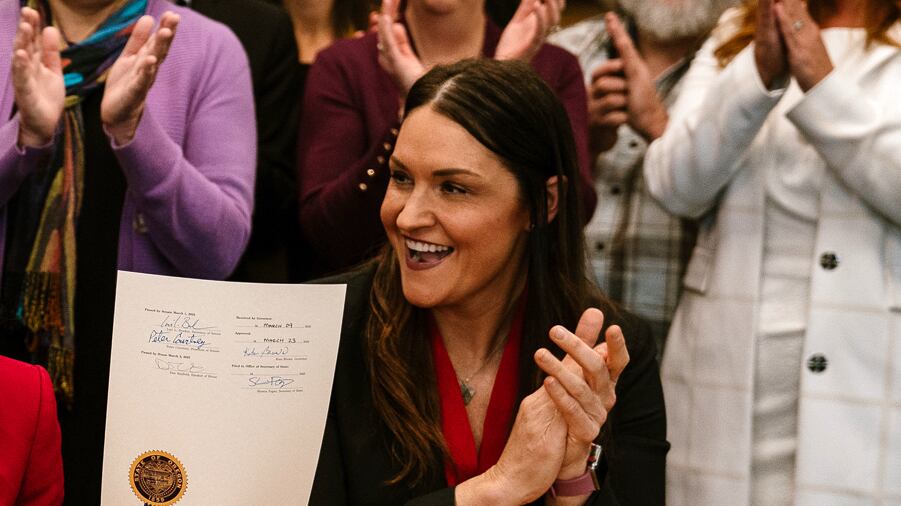On Thursday, WW revealed that Secretary of State Shemia Fagan had begun working as a consultant for a company affiliated with the embattled La Mota cannabis chain in February. On Feb. 15, records show, Fagan officially recused herself from an audit she was overseeing into the Oregon Liquor and Cannabis Commission, which has issued La Mota owners Rosa Cazares and Aaron Mitchell more than 50 licenses.
But records newly obtained by WW show that the Audits Division sent the final draft of the audit to the OLCC for its response on Feb. 8. That means auditors had finished nearly a year of work on the 33-page audit they released today.
In other words, the audit was already finished a week before Fagan took the unusual step of recusing herself so she could begin doing consulting work for a company regulated by the OLCC.
What’s more, working papers released to WW indicate Fagan’s new employer had an early role in determining the scope of the audit.
An email obtained by WW that Fagan sent to an audit staffer in Jan. 2021 asks that she reach out to Cazares: “Please reach out to Rosa...to schedule a call to discuss our Cannabis/OLCC Audit.” In June, she sent a similar email to Auditor Director Kipp Memmott: “As your team begins scoping for the Cannabis audit, please have them reach out to Rosa Cazares with La Mota.”
Four days prior to Fagan’s email to Memmott, Cazares emailed Fagan a list. It read: “Heavy Handed Enforcement, Micro Management, Takes productive time from business, Due Process, Middle Management, Law Enforcement - Inspector training, Restructure the rules: Actually needed/Public Safety, Advisory Panel, License fee 5,000-6,000 a year.”
Notes obtained from a December 2021 meeting between SOS executives and Audits Division managers read: “Shemia asked if the team had interviewed Rosa Cazares with La Mota. Kyle clarified that we haven’t yet begun interviews. Shemia said the initial impetus for the audit is a belief that folks who are running cannabis businesses are treated differently.”
In a subsequent meeting in June 2022 about the scope of the audit, notes show that Fagan asked: “Stories like Rosa’s (La Mota), do you have a good idea if these concerns carry any weight behind them? There was a story of one of her stores got robbed and they were fined because during the robbery their clerk didn’t keep their hands on the cash jar...? Did you ask about this?” It appears that’s the only question Fagan asked during the meeting.
Fagan spokesman Ben Morris said the Audits Division “conducted their work with integrity and followed strict government audit standards....The ultimate decision about the scope of the report was made by the auditors.”
Records show that audit staff interviewed Cazares in early 2022 as part of the audit. It’s normal for auditors to interview affected parties as part of their work. But Cazares was not only the CEO of one of Oregon’s largest cannabis companies, La Mota; she and her partner, Mitchell, and the companies they control had also given more than $200,000 to leading Democratic politicians, including $45,000 to Fagan, who, as secretary of state, oversees the state’s Audits Division.
Notes from the interview show that Cazares claimed the OLCC was sexist and ageist, and “doesn’t support people of color.”
“OLCC’s treatment of her makes her feel like a criminal. OLCC lacks sympathy for their business challenges. Her relationship with OLCC has gotten so bad, she will not have a conversation with the OLCC director. She doesn’t call OLCC,” the audit staffer wrote in notes from the interview.
Cazares said she and her partner and co-owner of the La Mota chain, Mitchell, “made so much money” when they opened their first dispensary in 2015 “they couldn’t count it fast enough.”
“She has no respect for the [OLCC],” the staffer wrote. “Rosa said they’ve never gotten respect from the agency and have never been supported by it even though…La Mota has over 60 licenses and employ many people through their business….No one can outwork her.”
The staffer added: “Rosa described OLCC and its rules as hindering business, saying Oregon companies are being suppressed. She spoke with the Speaker of the House about how big cannabis can be and said it’s an undervalued and underutilized industry. There’s not one thing she can say OLCC has done for the industry.”
Cazares said in the interview she wanted new leadership at the OLCC in part because of the way the agency had treated her, a Latina. Cazares suggested the agency would have treated her partner, Mitchell, a white male, with more respect. “She thinks if Aaron had been the face of their company, things would have gone very differently.”
WW has examined the legal and tax troubles of Cazares and Mitchell, who, along with their companies, face more than $7 million in state and federal tax liens and over 30 lawsuits in Oregon circuit courts. The OLCC has never suspended a license for the La Mota chain, despite several investigations.
Laura Kerns, a spokeswoman for the Audits Division, tells WW that Cazares’ interview was not used as evidence in the audit. “It’s important to note the team did interview Rosa in the course of scoping the audit, but ultimately decided not to use the interview as evidence for anything that appears in the report,” Kerns says.
